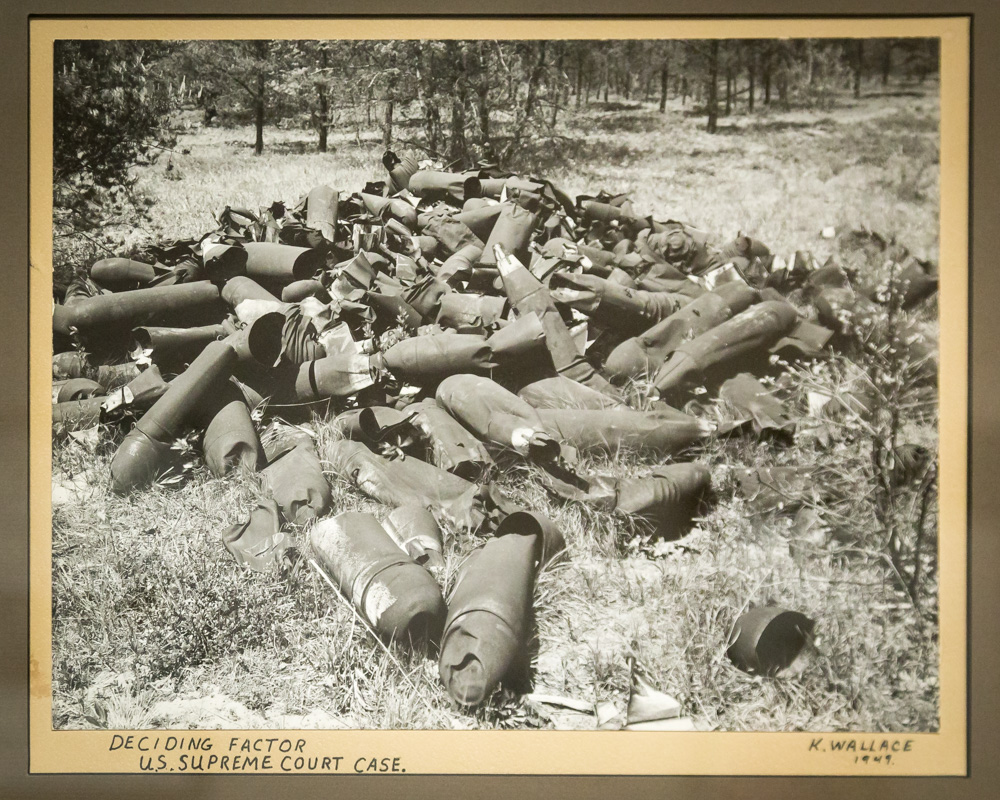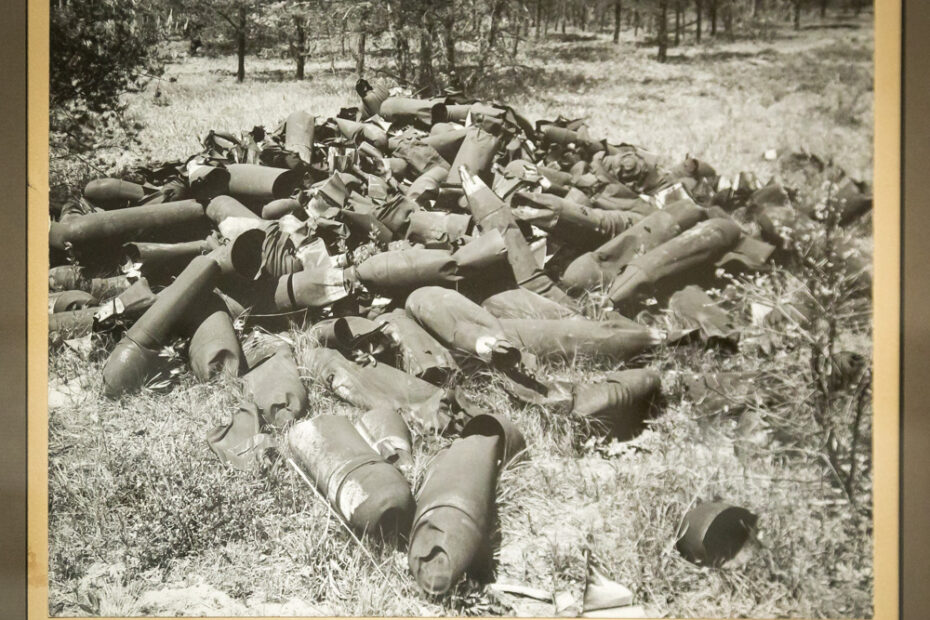“Nothing in the world can take the place of persistence.
Talent will not; nothing is more common than unsuccessful men with talent. Genius will not; unrewarded genius is almost a proverb.
Education will not; the world is full of educated derelicts.
Persistence and determination alone are omnipotent.
The slogan Press On! has solved and always will solve the problems of the human race.”On June 27, 2022, the United States Supreme Court rendered the unanimous opinion of Ruan v. United States,1 relying on the holding of the landmark case of Morissette v. United States,2 a case that made it to the Supreme Court solely because of the persistence of Andrew Jackson Transue (1903—1995), the first Genesee County lawyer to win a case in the Supreme Court.
Calvin Coolidge was President when Mr. Transue became a lawyer in 1926, so it may not be a coincidence that he embodied the persistence described by President Coolidge. Indeed, Transue, who practiced law for 69 years, lived by the motto: Never Give Up. Never, Ever, Ever Give Up.
– Calvin Coolidge.
Note: You can also find a published article of this story here.
In his early years, Transue served as the prosecuting attorney of Genesee County from 1933 and 1937, before being elected as a New Deal Democrat for 1 term in the US House of Representatives. But it was his efforts in Morissette that best displayed his persistence. The first sentence of Morissette alluded to that persistence:
This would have remained a profoundly insignificant case to all except its immediate parties had it not been so tried and submitted to the jury as to raise questions both fundamental and far-reaching in federal criminal law, for which reason we granted certiorari.
Joseph Morissette was charged with unlawfully, willfully, and knowingly stealing government property. The Court described Morissette as a fruit stand operator in the summer and a trucker and scrap iron collector in the winter, who while deer hunting discovered abandoned practice bombs dumped in heaps, exposed to the weather, and rusting away on government property. Thinking they were cast-off and abandoned, Morissette loaded 3 tons of them on his truck, had them crushed at a nearby farm, and trucked them to Flint, all in broad daylight, in full view of passers-by without any effort at concealment.
Morissette first came to the attention of the Michigan State police (according to his nephew Keith Panek) when he stopped for lunch in Standish. There he spoke with an officer, openly disclosing where he had gotten the practice bombs. Morissette took the practice bombs to Flint where he sold them for $86. Later that year, when Morissette was in Cheboygan getting a Christmas tree, that same Michigan State Police officer stopped him and asked him what he had done with the practice bombs. He told the officer that he had sold them for $28 a ton. When contacted later by the FBI, Morissette voluntarily, promptly, and candidly told of finding the bombs, saying he had no intention of stealing but thought the practice bombs were abandoned, unwanted and considered of no value to the government.
According to Genesee County attorney John Nickola (1940—2019), Morissette was a tenant of a mobile home park in Mt. Morris Township operated by John Nickola’s parents, David and Mary Nickola (who were also the grandparents of Genesee County attorney David Nickola and 67th District Judge Vikki Bayeh Haley). After his arrest, Mary told him to call their attorney, Mr. Transue. According to Panek, Transue took on the defense of Morissette as a pro bono case, as Morissette could only give Transue a promise to pay.
The case went to trial and Morissette was convicted and sentenced to 2 months imprisonment or pay a $200 fine. At trial, Transue contended that the government had to prove that the taking must have been with felonious intent. But the trial judge refused to allow Transue to show the jury that Morissette thought the practice bombs were abandoned and that Morissette acted with innocent intentions. The trial judge ruled that felonious intent is presumed by Morissette’s actions. The trial judge then instructed the jury that if Morissette, without any permission, took the practice bombs that were on government property, then he was guilty of the offense, indicating that the question of intent is whether or not he intended to take the practice bombs.
In what was probably not the first time he disagreed with a trial judge, Transue appealed, after agreeing with a dubious Morissette to pay for half the costs of the appeal. The appeal was decided by the 6th Circuit Court of Appeals, which in Morissette v. United States,3 affirmed. When Transue announced to Morissette that he wanted to the appeal to the Supreme Court, Morissette was reluctant. “Who knows the most about the law, these Federal Judges, or my lawyer? I can’t afford to appeal. I didn’t mean to steal anything, but I will pay the fine, and put an end to this thing.”
Not willing to give up, Transue convinced Morissette to let him appeal to the US Supreme court by agreeing to do it at his own expense. Transue traveled to Washington DC for oral argument with his wife Vivian and their two daughters, ten-year-old Tamara, and five-year-old Andrea. Sitting in the audience gallery, Tamara recalled thinking that her dad was nervous because he drank a lot of water.
During oral argument, Transue presented a photo of the pile of remaining abandoned practice bombs that Morissette did not take. Justice Douglas remarked upon seeing the photo: “Why, it’s just a bunch of junk.” The photo was given to me by Genesee County attorney Richard Figura, who received it from the photographer’s son, Ken Wallace, after a chance meeting. During a meeting with John Nickola, I mentioned I had the photo. Nickola had known Transue since he was 8 years old and openly expressed great admiration of Transue, as he had encouraged Nickola go into law. Upon seeing the photo, Nickola exclaimed that it was sacred to our profession, like finding the “Holy Grail.” The photo was admitted into the permanent exhibit collection of the Genesee Circuit Court on September 14, 2017, with Transue’s children, Andrea and Tamara, in attendance.

In reversing Morissette’s conviction, the Supreme Court stated that it could find no grounds for inferring any affirmative instruction from Congress to eliminate intent from any offense with which Morissette was charged, setting forth its rationale:
The contention that an injury can amount to a crime only when inflicted by intention is no provincial or transient notion. It is as universal and persistent in mature systems of law as belief in freedom of the human will and a consequent ability and duty of the normal individual to choose between good and evil. A relation between some mental element and punishment for a harmful act is almost as instinctive as the child’s familiar exculpatory ‘But I didn’t mean to,’ and has afforded the rational basis for a tardy and unfinished substitution of deterrence and reformation in place of retaliation and vengeance as the motivation for public prosecution. Unqualified acceptance of this doctrine by English common law in the Eighteenth Century was indicated by Blackstone’s sweeping statement that to constitute any crime there must first be a ‘vicious will.’ Common-law commentators of the Nineteenth Century early pronounced the same principle, although a few exceptions not relevant to our present problem came to be recognized. Crime, as a compound concept, generally constituted only from concurrence of an evil-meaning mind with an evil-doing hand, was congenial to an intense individualism and took deep and early root in American soil.
If one of the features of wisdom is knowing basic truths, I believe that Transue had early on internalized the truth enunciated by the Court. Therefore, when Morissette told Transue that he did not intend to steal, Transue immediately knew how he would defend Morissette. I have little doubt based upon my years with Transue that he meticulously researched the concept of intent to steal and carefully planned his strategy for presenting it to the jury and then making a good record of his objection when the trial judge denied his request.
Morissette has been cited over 10,000 times since it was issued in 1952, the latest being the opinion in Ruan. In Ruan, the Supreme Court vacated the conviction under the Comprehensive Drug Abuse Prevention and Control Act for “knowingly or intentionally” distributing a control substance “except as authorized.” The Court held that once a defendant meets the burden of producing evidence that his/her conduct was “authorized,” the government must prove beyond a reasonable doubt that the defendant knowingly or intentionally acted in an unauthorized manner.
The Ruanrationale was largely based upon Morissette. The Supreme Court indicated that as a general matter our criminal law seeks to punish the vicious will. With few exceptions, wrongdoing must be conscious to be criminal. Indeed, consciousness of wrongdoing is a principle as universal and persistent in mature systems of criminal law as belief in freedom of the human will and a consequent ability and duty of the normal individual to choose between good and evil.
Mr. Transue often said that his duty as a lawyer was to accept the position of his client and then to do his very best to move the client to a better position. I am sure that those of us who had cases with him could tell stories about his persistence and whether he moved his client to a better position, but those stories are for another time.
Biography
Peter M. Doerr has practiced law in Genesee County, Michigan, for 45 years, the first 3 years of which were with Andrew Jackson Transue.
1 142 S.Ct. 2370 (2022)
2 72 S.Ct. 240 (1952)
3 187 F.2d 427 (1951)
